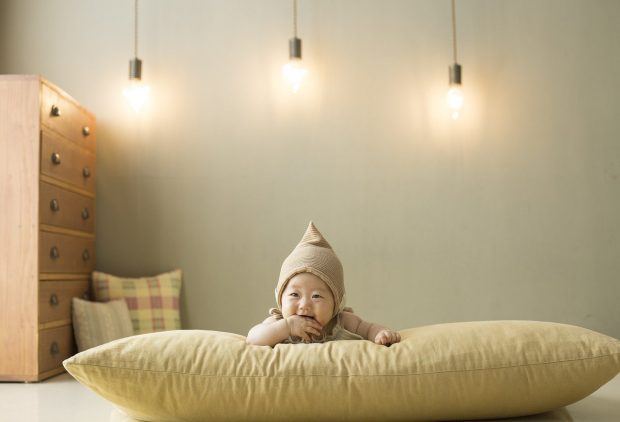Getting a baby to sleep alone without needing to be breastfed or carried doesn’t seem like an easy thing. Most babies have to be rocked all night, so they can sleep soundly. To reduce hassles when putting your baby to sleep, it is good to start your little one on sleep training. Longevity Live Paid Content.
Sleep training teaches babies to sleep on their own without help. That means the baby only needs to be placed in the crib, and they will fall asleep by themselves without being rocked, hugged, or breastfed. Sleep training also teaches the baby how to sleep again after waking up at night.
Experts recommend starting sleep training when babies are around 4 to 6 months old. This age range is good because, around the age of 4 months, some babies will experience changes in sleep patterns. Therefore, this is an appropriate time to do sleep training.
What Is Sleep Training for Baby?
Sleep training is the process of teaching a baby to fall asleep on his own and sleep through the night without requiring parental or caregiver intervention. This involves establishing good sleep habits and teaching babies to feel comfortable and safe sleeping on their own.
Sleep training in babies is important because adequate and quality sleep is essential for healthy growth and development. Babies who sleep enough have stronger immune systems and are less likely to experience obesity, anxiety, and other health problems.
In addition, when babies sleep alone, parents and caregivers can also get enough rest, which is very important for their mental and physical health. Sleep training can help establish a good sleep routine and help babies learn self-regulation and become more independent.
However, it is important to remember that every baby is different, and not all sleep training methods are suitable for all families. It’s important to talk to your baby’s doctor and consider the right options for your family and your baby.
When Should Baby Start Sleep Training?
Sleep training for babies depends on the preferences and needs of each family. However, some experts recommend starting to introduce good sleeping habits to babies from an early age, which is around 4-6 months of age.
At that age, babies are starting to learn to regulate their sleep patterns and are usually able to sleep longer at night without the need to eat or drink milk too often. In addition, at that age, babies have also begun to learn to feel comfortable sleeping alone.
However, it’s important to remember that every baby is different, and some babies may not be ready for sleep training at that age. So it’s important to watch for signs of baby readiness and consider sleep training methods that work for both baby and family.
What Should Be Done Before Starting Sleep Training for Baby?
Before starting sleep training for babies, there are several things that you can do to prepare babies and families for sleep changes that will occur, including:
1. Consult a doctor
Before starting sleep training, it is advisable to consult a baby doctor to ensure that your baby is ready and healthy to sleep longer at night. Professional staff, such as a baby doctor, will be able to provide the right advice and recommendations when you are doing sleep training.
2. Create a consistent bedtime routine
Establishing a consistent bedtime routine can help your baby feel calmer and ready to sleep. For example, by giving a warm bath, reading stories or singing lullabies, and turning off the lights.
Make sure you stick to a regular schedule and put your baby to bed at a consistent time every night. The earlier, the better, and usually around 7 or 8 PM.
Some experts also recommend that babies should be kept full before going to bed, so they don’t get hungry in the middle of the night. To prevent your baby from constantly waking up, you should also make sure they are comfortable and not feeling too cold or too hot. Set the aircon temperature at around 22-26°.
3. Recognize the signs of baby readiness
Every baby has different sleep needs, so it’s important to pay attention to signs of baby readiness before starting sleep training. Some signs of a baby’s readiness are the ability to sleep longer at night without needing to feed as often, and the ability to feel comfortable sleeping alone.
READ: what you should know before jogging with your baby
4. Prepare yourself mentally
Sleep training can be a challenge for parents because changing a baby’s sleep habits can take time and requires a lot of consistency. In addition, letting your baby cry or whimper while he is learning to sleep on his own can also be emotionally challenging for parents.
In addition, sleep training can also be a challenge if parents feel unsure about the method chosen or feel guilty for letting the baby cry or whine. Some parents are also worried that sleep training can harm the health and development of their babies.
However, keep in mind that sleep training can be safe and effective. All you need is the right method and paying attention to the needs and signs of the baby. In addition, sleep training can also provide great benefits for the health and development of babies and help parents get enough rest and good mental health.
Takeaway
By preparing yourself and your baby before starting sleep training, families can minimize stress and increase their chances of success. If parents find it difficult to do sleep training, it is advisable to seek support from the people closest to them, a baby doctor, or an experienced baby sleep consultant.




![women [longevity live]](https://longevitylive.com/wp-content/uploads/2020/01/photo-of-women-walking-down-the-street-1116984-100x100.jpg)










